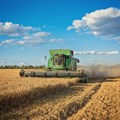
Clive Roberts, Segment Lead: CPG - Anglophone Africa at Schneider Electric
Furthermore, major Pan-European manufacturing companies now require (supplying) farms to measure and monitor their emissions. This, in turn, has compounded the challenge of steep food prices and the need to comply with regulatory authorities from a food safety point of view as well as the UN’s sustainability goals.
In South Africa, the agriculture sector has also been faced with access to cost-effective reliable and available power, as well as water scarcity. On the other hand, droughts have impacted crop production and livestock husbandry, prompting the adoption of drought-resistant harvests, enhanced irrigation methods, and efficient water management strategies.
To this end, South Africans, and in fact, farmers across the world, are turning to digital technologies to improve their operations and take the sector one step closer to reducing the costs of operations and be able to become good environmental stewards.
Modernising agriculture
Modern farming techniques and technologies have the potential to play an all-important role in enhancing agricultural productivity and sustainability. In South Africa, we’re seeing an exciting adoption of precision agriculture, biotechnology, and improved mechanisation.
Supporting the above are technologies such as the use of the Industrial Internet of Things (IIoT), drones, and cloud-based reporting tools – all contributing to improved agricultural resilience, sustainable operations and overall competitiveness. This, in turn, provides decision-makers with the agility to make decisions within seconds.
Implementing practical solutions
Agriculture, however, often lacks the necessary, infrastructure to deploy the abovementioned technologies; the average farm is simply not built to handle large, on-premises software installations.
A cloud-based solution allows farmers to experience the benefits of digital transformation without extensive capital investment or large IT overhead. Plus, if farmers opt for a scalable, hardware-agnostic cloud solution, they can easily build on top of existing hardware, where relevant, without having to worry about interoperability issues.
Farmers operate in a time-sensitive environment and must respond quickly to shifting weather, crop and market conditions. Furthermore, fields and equipment are often kilometres apart, which means conducting accurate on-site assessments requires extensive travel time.
With digital technology, farmers can readily assess how their equipment is performing. Advanced cloud and mobility capabilities mean farmers can not only view the status of critical equipment such as irrigation pivots, but they can control it on mobile devices. Pivots for example can be turned on or off remotely, water delivery adjusted, or pumps started or stopped.
Ultimately, the enhanced visibility and control provided by digital transformation allows farmers to use their resources more efficiently, reducing costs and increasing their contribution to environmental sustainability.
In South Africa, we’re seeing farmers marrying technological innovation and sustainable practices, all to strategically prepare for the future, Schneider Electric's commitment to environmental responsibility aligns with these principles, further supporting the nation's farmers in their journey towards sustainable agriculture.



































